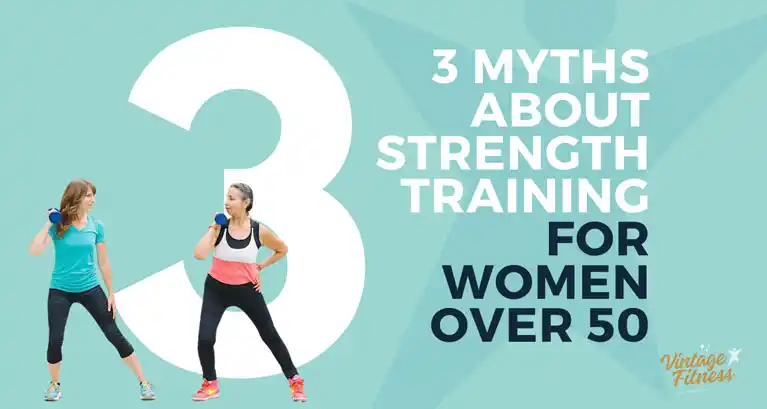3 Myths About Strength Training for Women Over 50

Strength training for women over 50 is one of the most powerful ways to stay healthy, strong, and independent. Unfortunately, many myths still discourage women from picking up weights or trying resistance training. Let’s break down the three biggest misconceptions and show why strength training is safe, effective, and essential at every stage of life.
Myth #1: Strength Training Will Make You Big and Bulky
Only years of extremely intensive training to achieve a bodybuilder’s physique will make someone bulky. After age 40, muscles and strength naturally decline, leaving us weaker and frailer. Strength goes down – risk of chronic diseases goes up. Rather than making you bulky, strength training helps combat the inevitable muscle loss of aging, increasing your longevity, not your dress size.
Myth #2: Strength Training Is Too Hard on Our Bodies
Strength training meets you where you’re at. You don’t have to be a big, burly gym guy to strength train. Start with what your body can comfortably handle and build up slowly. It’s about being stronger today than you were yesterday. At 50, 60, or even 90 years old – it’s never too late to get stronger, and you’ll be amazed by what your body is capable of.
Myth #3: Strength Training Is for Men, and Cardio Is for Women
Gym culture often encourages men to get strong while women stick to cardio machines. But resistance training is the only proven way to offset age-related declines in bone density and strength. Not comfortable with weights? No problem – body weight exercises and resistance bands are effective tools for improving strength, functional fitness, grip strength, and even gait speed.
Ready to Get Started?
Need some guidance on how to strength train safely and effectively? Call us at +1 (866) 471-0109 to see how we can help.
And if you missed our FREE webinar on bone strength, you can watch the replay in the Past Webinars section of our webinars page. In this session, we dive into practical ways strength training can keep your bones healthy and your body mobile. For more tips and resources, check out our Blog.
FAQ: Strength Training for Women Over 50
- Is strength training safe for women over 50?
- Yes. With proper guidance, strength training is one of the safest and most effective ways to improve health, mobility, and independence after 50.
- Do I need heavy weights to see results?
- No. Body weight exercises and resistance bands can deliver excellent results and are a great way to start.
- What benefits can I expect from strength training?
- Benefits include stronger muscles and bones, better balance, reduced risk of falls, improved metabolism, and greater confidence in daily activities.
- How often should women over 50 strength train?
- Two to three times per week is ideal for maintaining and building strength, with rest days in between to allow muscles to recover.
Source: Inspired by Dr. Jaime Seeman’s TEDx talk, “Why Women Need to Get Serious About Strength.” Dr. Seeman is a board-certified Obstetrician-Gynecologist with expertise in integrative medicine, exercise science, and nutrition.
Book a Free Consultation
Ready to see how strength training for women over 50 can work for you? Book a free consultation with Vintage Fitness today, or learn more about our Stay Strong senior strength training program in Toronto
With Gratitude,
Leigh
About Vintage Fitness: Since 2005, we’ve helped older adults improve their strength, mobility, and quality of life with customized in-home fitness programs.
Search
Categories
- Abdominal / Waist Exercises
- Aches and Pains
- Aging Well
- Arm Exercises
- Arthritis
- Back exercises
- Balance for Seniors
- Core
- Diabetes
- Elastic Band Exercises
- Exercise Programs
- Fitness Goals
- Flexibility Exercises
- Guest blog
- Hands
- Heart Health
- Incontinence Exercises
- Knees
- Leg Exercises
- Mental Health
- Neck Exercises
- Nutrition
- Osteoporosis
- Other
- Personal Training
- Posture
- Sciatica
- Shoulder
- Strength Exercises
- Stretching Exercises
- Success Stories
- Virtual Training
- Webinar
- Weight Loss
- Women’s Health





